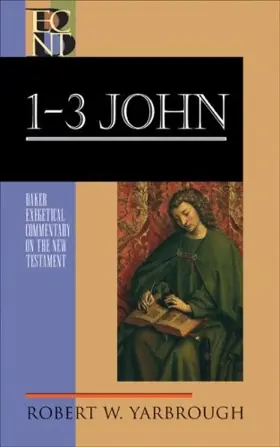

1–3 John
in Baker Exegetical Commentary on the New Testament
Pages
480
Publisher
Baker Academic
Published
1/1/2008
ISBN-13
9780801026874
Robert Yarbrough, coauthor of the bestselling Encountering the New Testament, offers a historical and theological commentary on the Johannine Epistles in this new addition to the BECNT series. The commentary features the authors detailed interaction with the Greek text, explores the relationship between Johns Epistles and Jesuss work and teaching, interacts with recent commentaries, is attentive to the history of interpretation, and seeks to relate these findings to global Christianity.
Collections
This book appears in the following featured collections.
- Basic Library Booklist by Detroit Baptist Theological Seminary
- Building an NT Commentary Library by Invitation to Biblical Interpretation (Kostenberger & Patterson)
- Recommended New Testament Commentaries for Evangelical Pastors by Thomas R. Schreiner
- TGC: Scholarly Commentaries by The Gospel Coalition
Reviews
Yarbrough’s is a gem of a commentary. Carson says this work “is the place to start for pastors with functioning Greek.” He interacts thoroughly with Greek and also theologically rich and deeply pastoral. There is humor, zest, and deep devotion. Although it is a substantial and technical work, readers who aren’t as familiar with Greek may also find this a useful resource.
[Full Review]
I have become a collector of commentaries ever since my seminary days in the 1990s. As such, I am only going to recommend the best overall commentary for each book of the Bible on this site. Perhaps not as helpful in the areas of illustration and practical application as I typically like, the depth of insight that Yarbrough offers just proves stronger than other commentaries I have consulted on 1-3 John.
Noteworthy in-depth evangelical commentary.
[Full Review]
Yarbrough’s commentary appears not to be a step down from Kruse’s in quality. It is, however, longer and a little more difficult. D.A. Carson commends it saying, “He writes with color and verve; he is never leaden or boring. More important, he combines good exegesis, theological reflection, interaction not only with the most recent Johannine scholars but with two or three major figures in the past … pastoral insight, and an independent judgment that means his work is always fresh.” It sounds like it would make a great one-two punch when combined with Kruse’s work.
[Full Review]
Yarbrough's analysis of the text and of the scholarly literature are both excellent. As a pastorally-minded academic, he is concerned to convey the same applicability of the age-old message that suffuses John's letters. At the same time, as a scholar, Yarbrough is concerned to handle the secondary literature thoroughly. One area of weakness is the BECNT formatting, which is a matter of personal preference I suppose. Another, however, is the author's sometimes awkward translations, which become a distraction on occasion. The author's exegesis and exposition always make sense of his phrasing, and the issue is minor, but distracting nonetheless.
Like the Pillar series, the Baker Exegetical series of commentaries have also been consistently outstanding. Yarbrough, like Kruse, is an accessible author. If you can get two commentaries on John's letters, start here with Kruse and Yarbrough.
[Full Review]
Von den ersten Seiten an gibt sich R.W. Yarbroughs Kommentar zu den drei Johannesbriefen als zwar historisch-kritischem Arbeiten verpflichtet, dies aber „within the framework of informed evangelical thought“ (vii). Das dabei entstehende Zueinander, das für viele der bisherigen Bände der von Baker Academics publizierten Kommentarreihe bewusst angezielt ist, ist wohl der entscheidende Hintergrund meiner folgenden Anfragen. Dies soll aber nicht meine grundsätzliche Wertschätzung für die Leistung des Autors, der einen umfangreichen und über weite Strecken gelehrten Kommentar vorgelegt hat, schmälern. In seiner Einleitung sucht Yarbrough auf verschiedensten Ebenen, die Glaubwürdigkeit und Ungebrochenheit kirchlicher Traditionen über die Johannesbriefe zu betonen. Dies zeigt sich im Ansatz bereits in der Darstellung der Textgeschichte, wo der Autor betont, dass die erhaltenen Varianten keinerlei wichtige Fragen der Interpretation bzw. der Lehre des Briefs berühren.
[Full Review]





